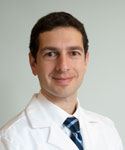 Eli Miloslavsky, MD, is co-founder of the Vasculitis and Glomerulonephritis Center at Massachusetts General Hospital and an instructor of medicine at Harvard Medical School, both in Boston. His research has focused on improving education for rheumatology fellows. He recently agreed to answer a few questions for The Rheumatologist and eNewsRheum.
Eli Miloslavsky, MD, is co-founder of the Vasculitis and Glomerulonephritis Center at Massachusetts General Hospital and an instructor of medicine at Harvard Medical School, both in Boston. His research has focused on improving education for rheumatology fellows. He recently agreed to answer a few questions for The Rheumatologist and eNewsRheum.
Question: You’ve researched the barriers between internal medicine (IM) subspeciality fellows and IM residents. What are your most important takeaways from that work?
Answer: First, fellows enjoy teaching residents when they get a chance to do it, and residents really value fellow teaching, especially on the wards, where their formal learning opportunities may be limited. However, in the hospital environment, many barriers stand in the way of that teaching interaction. Not all of the barriers relate to workflow-based issues, such as the workload of residents and fellows, and disparate rounding schedules. Other barriers—such as residents perceiving that fellows may be too busy to teach them and vice versa—that prevent the teaching interaction from taking place are equally important, and many of these barriers are amenable to intervention.
Q: You developed the Fellow as Clinical Teacher (FACT) curriculum to enhance fellows’ ability to push through barriers to teach during consultation. How valuable is this type of approach?
A: We developed the FACT curriculum to specifically address the challenges fellows face when teaching on the in-patient consult service, including the limited time available to teach and not knowing their learners, among others.1 We have evaluated the FACT curriculum in multiple rheumatology fellowship programs, as well as in other subspecialties. Our studies have demonstrated that the FACT curriculum improves fellows’ teaching skills in this setting and makes them more likely to engage in teaching. Increasing fellow teaching on the wards may have a potentially broad positive impact, including enhancing communication between teams, thereby improving patient care; improving rheumatology knowledge among residents through learning and among fellows through teaching; and even helping residents consider a career in rheumatology.
Q: Can your FACT pilot be replicated elsewhere?
A: The FACT curriculum can be administered in any fellowship program. We have provided our curriculum materials to a number of fellowship programs that have successfully implemented the curriculum with their fellows. The curriculum focuses on two major aspects of teaching during consultation: 1) Overcoming barriers to teaching in the setting of inpatient consultation, such as time constraints, and hospital-based barriers such as communication, among others. And 2) developing an effective technique for teaching during consultation, a setting that can make it challenging to assess your learner, their interests, strengths and knowledge gaps. Using video examples, data from our research and a novel framework, called the PARTNER framework, that we developed for teaching during consultation, the curriculum helps fellows overcome barriers to teaching and use the teaching opportunities they are able to create effectively and efficiently.



